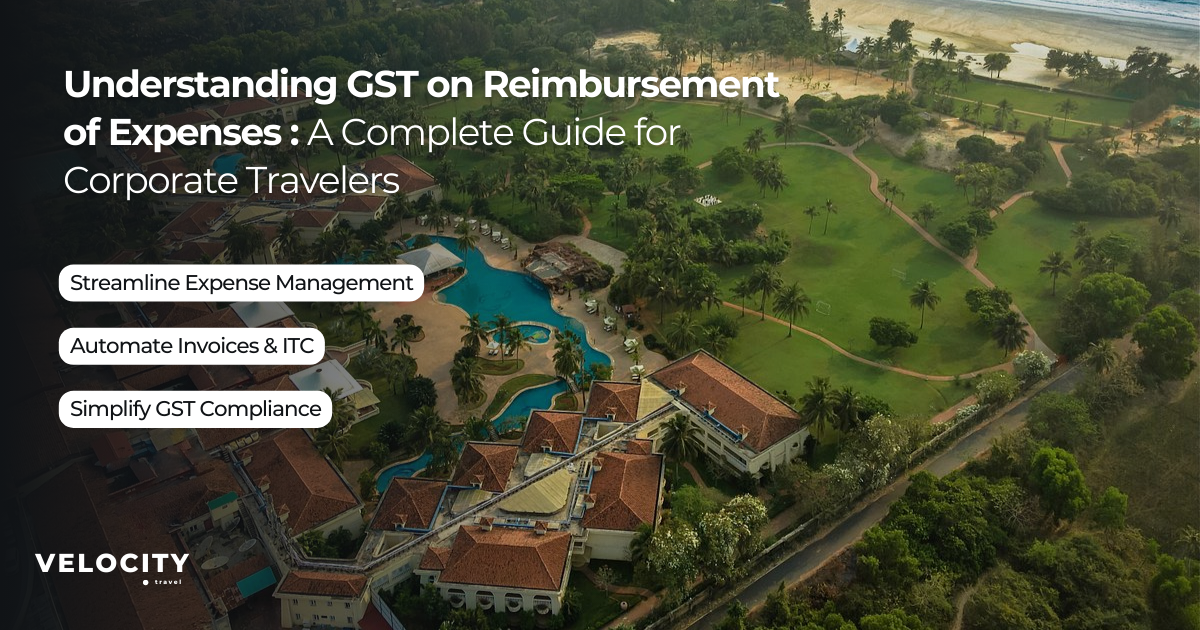For travel administrators, HR managers, and finance teams, effectively managing corporate travel expenses is a vital responsibility. One often complex aspect is ensuring compliance with Goods and Services Tax (GST) regulations on reimbursement of expenses. Whether it’s related to travel, accommodation, or incidentals, understanding GST implications ensures financial accuracy and regulatory adherence.
Table of Contents
ToggleThis guide outlines the understanding of GST on reimbursement, including things like rates and compliance, as well as how corporate travel solutions such as Velocity Travel can help.
What the GST on Reimbursement of Expenses Is?
Reimbursement of expenses refers to the repayment of costs incurred by employees or vendors on behalf of the company. GST applies to these reimbursements in specific scenarios, particularly when they are linked to taxable goods or services.
Why It Matters to Your Team:
Let’s understand why GST on reimbursement of expenses matters to your team.
- Travel Admins: Must ensure that travel bookings and reimbursements align with GST regulations to avoid financial discrepancies.
- HR Managers: Play a role in defining and implementing reimbursement policies that comply with tax laws.
- Finance Teams: Are responsible for processing claims, managing Input Tax Credit (ITC), and ensuring accurate GST filings.
GST Rules for Reimbursement of Expenses
Knowledge of the rate of GST on reimbursement of expenses and the rules governing it is extremely important for every enterprise.
1. Pure Agent Principle:
Taxability of reimbursement depends on the fact that whether the person who incurred the expenditure acts as a ‘Pure Agent’ under the concept of GST or not. A pure agent spends money on a client’s behalf and does not charge the client extra or add a profit margin.
Key conditions to qualify as a pure agent:
The following are the key conditions to qualify as a pure agent:
- The expense cannot be incurred for any purpose other than for the benefit of the client or the work done for the client.
- There must be documentary evidence, such as bills or invoices showing the cost spent.
- The agent cannot afford to give an impression that he or she owns the particular goods or services being transacted.
If the conditions of pure agent criteria are fulfilled, GST on reimbursement may not apply.
Why It Matters for Teams:
- Travel Admins: Ensure that documentation for travel bookings adheres to pure agent criteria.
- HR Managers: Establish clear guidelines for employee expense submissions.
- Finance Teams: Verify that claims meet pure agent requirements before processing reimbursements.
2. Input Tax Credit (ITC):
Businesses can claim ITC on reimbursement of expenses under GST, provided:
- The expenses are associated with the tax on supplied goods and services.
- Receipts for GST are in the name of the company.
- It must be noted that the business operates as a GST-registered company.
3. GST Rate on Reimbursement of Expenses:
The GST rate on reimbursement of expenses varies depending on the type of expense:
- Travel services: Normally it ranges from 5 percent to 18 percent, depending on whether it is economy or business class travel.
- Accommodation: To the extent of about 12 percent to 28 percent depending on the room tariff.
- Professional services: Standard rate of 18 percent.
Action Points for Teams:
- Travel Admins: Classify travel expenses by GST rate for accurate accounting.
- HR Managers: Ensure employees are educated about the GST structure for their expense claims.
- Finance Teams: Map expense categories to applicable GST rates during filings.
Typical Spheres of GST on Reimbursement
There are always several situations where corporate travellers are in a position where they need to be reimbursed for the GST. Let’s examine some common scenarios:
1. GST on Tours and Travels:
Services like flight tickets, rail tickets, hotels, and many more come under the ambit of GST. However, tax rates depend on specific factors:
- Domestic airfare: 5% of the economy class or 12% of business class.
- Hotel stays: May increase by room tariff starting from 12%.
- International travel: GST is normally not charged for international flight tickets.
2. Employee Expense Claims:
For employee-claimed expenses like meals, fuel, or transportation:
- GST applies where the company is providing reimbursement for taxable expenses.
- ITC eligibility requires proper documents like a valid GST invoice to make the claim authentic.
3. Vendor Payments:
GST is added to the invoice when businesses directly pay vendors for services such as event hosting or consultancy and has to be reported in the reimbursement claim.
How Different Teams Can Manage GST on Reimbursement?
Let’s understand how different teams in an organisation can manage GST on reimbursement of expenses:
For Travel Admins:
- Use corporate travel platforms like Velocity Travel to centralise bookings and automate GST calculations.
- Consolidate travel invoices to simplify GST filings.
- Ensure compliance by tracking GST rates across travel categories.
For HR Managers:
- Develop reimbursement policies that align with GST laws.
- Educate employees about the importance of GST-compliant invoices and expense categorisation.
- Collaborate with finance teams to define acceptable claim limits for reimbursable expenses.
For Finance Teams:
- Ensure timely GST filings with accurate reimbursement data.
- Regularly audit expense claims to validate ITC eligibility.
- Leverage technology to manage GST calculations and reporting.
Legal Concerns for Business Organisations
The main challenge of GST on reimbursement of expenses is that failing to adhere to compliance measures exposes organisations to penalties.
1. Documentation:
Maintain accurate records, including:
- GST-compliant invoices.
- Expense accounts are supported by more detailed information about the expenditure.
- Written agreements about how expenses will be split.
2. Tax Filings:
Make sure that there are no mistakes on GST filings when it comes to reimbursement of expenses under GST. The omission of these expenses is likely to lead to audits or fines.
3. Input Tax Credit Validation:
Make sure that reimbursement of expenses under GST aligns with GST regulations to claim eligible ITC. Any mistake makes it difficult to detect and prevent disallowed credits.
4. Regular Audits:
Periodic audits of expense reimbursements are key recommendations that need to be taken to avoid any mishaps.
How Velocity Travel Simplifies GST on Corporate Travel?
Velocity Travel provides corporate travel management solutions and assistance to businesses in managing GST on reimbursements effectively. Here’s how:
- Centralised Expense Management: Through Velocity Travel, all costs incurred while travelling are captured in a single system, making it easier to implement and follow GST regulations.
- Automated GST Calculations: The platform automatically computes the relevant GST for travel bookings, so there are fewer chances that errors will be made.
- Invoice Management: With Velocity Travel, all invoices are generated as per GST laws, thereby helping simplify ITC claims.
- Customised Reporting: Audits and compliance are easier for businesses as the detailed report of expenses and GST filings is available.
Challenges in Managing GST on Reimbursement
Despite clear regulations, businesses often face challenges in managing GST on reimbursement, including:
1. Complex Tax Structures:
Different GST rates applicable on different related services like travel, accommodation, meals, etc. can pose a compliance challenge.
2. Lack of Documentation:
Failure to produce the invoice or receiving an inaccurate invoice is another limitation to claiming ITC.
3. Pure Agent Disputes:
Failure to understand the pure agent principle can lead to wrongful GST applications.
4. Dynamic Rules:
There has been a constant change of laws governing GST, which necessitates businesses updating themselves to avoid being penalised.
Best Practices for Managing GST on Reimbursement
To navigate these challenges, businesses should adopt the following best practices:
1. Use Corporate Travel Solutions:
Platforms like Velocity Travel have been developed that allow for the centralisation of travel and expenses, making sure they are compliant with GST.
2. Maintain Accurate Records:
- Travel Admins: Ensure all bookings generate GST-compliant invoices.
- HR Managers: Require employees to attach invoices to reimbursement claims.
- Finance Teams: Store all relevant documents for at least five years for audit purposes.
3. Train Employees:
Educate employees on the various GST requirements, particularly in the processing of GST-compliant receipts for reimbursable expenses.
4. Conduct Regular Reviews:
Assess reimbursement policies from time to time to align with the latest GST regulations.
5. Leverage Technology:
Automate expense management and GST calculations with reliable tools like Velocity Travel to reduce manual mistakes.
6. Seek Professional Advice:
Seek professional advice and ask them to help with issues like composite supply classifications or a pure agent issue.
Summing Up
For travel admins, HR managers, and finance teams, understanding GST on reimbursement of expenses is crucial for financial accuracy and regulatory compliance. Whether it’s navigating varying GST rates, claiming ITC, or ensuring proper documentation, every step plays a vital role in effective expense management.
With the help of platforms like Velocity Travel, your team can automate compliance, reduce manual errors, and streamline processes. By adopting best practices and leveraging expert solutions, your organisation can optimise travel management while staying tax-compliant.
Ready to simplify your corporate travel and GST management? Explore Velocity Travel today.
FAQs About GST on Reimbursement of Expenses
1. Is GST applicable to reimbursement of expenses?
Yes, GST is applicable on reimbursement of expenses if the reimbursement is directly linked to taxable supplies and does not qualify under the pure agent exemption. Proper documentation is essential for compliance.
2. What is the GST rate on reimbursement of expenses?
The GST rate on reimbursement of expenses depends on the nature of the expense, such as 5% for economy travel, 12% for business-class airfare, and up to 28% for luxury hotel accommodation.
3. Can businesses claim ITC on GST paid for reimbursement of expenses?
Yes, businesses can claim ITC on GST paid for reimbursed expenses if the invoices are GST-compliant and the expenses are incurred for taxable supplies.
4. How does GST impact reimbursement of expenses under tours and travels?
Under GST, travel and accommodation expenses are subject to varying tax rates, with services like domestic flights taxed at 5% or 12%. Proper classification and documentation are crucial for accurate tax filings.
5. How can Velocity Travel simplify GST compliance for reimbursement of expenses?
Velocity Travel automates GST calculations, provides GST-compliant invoices, and streamlines reporting for travel-related expenses, ensuring compliance and easing the burden on travel admins, HR managers, and finance teams.

